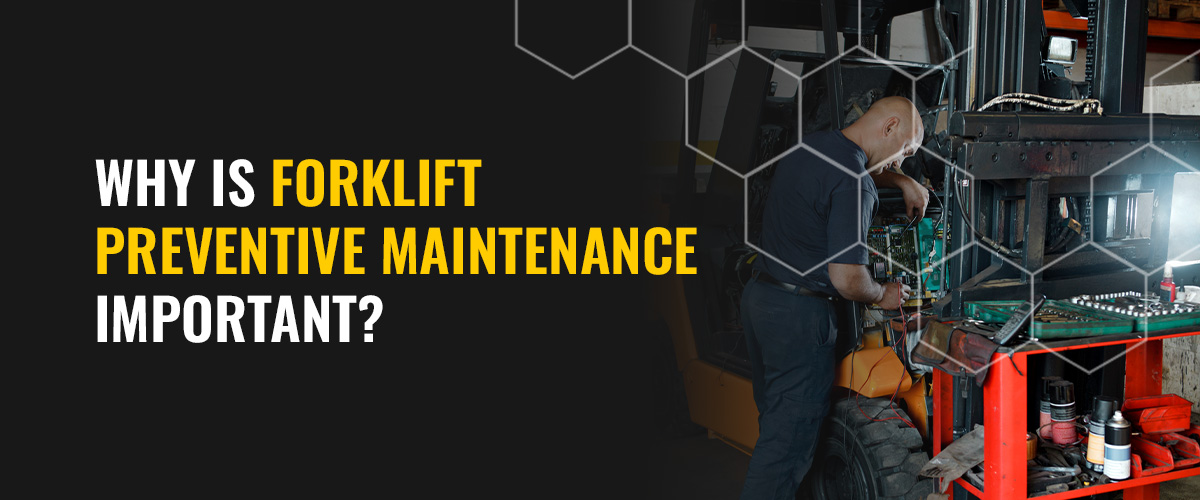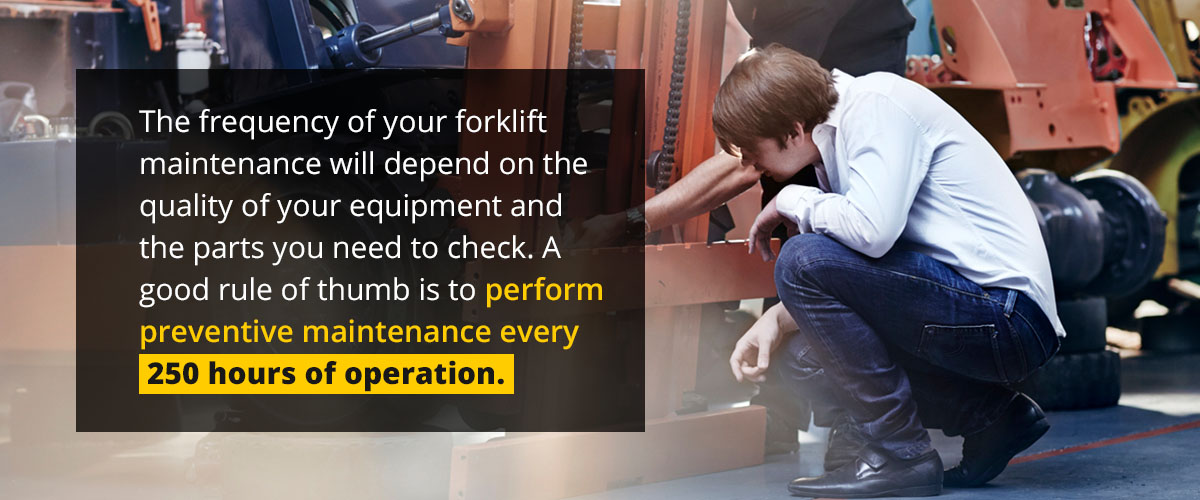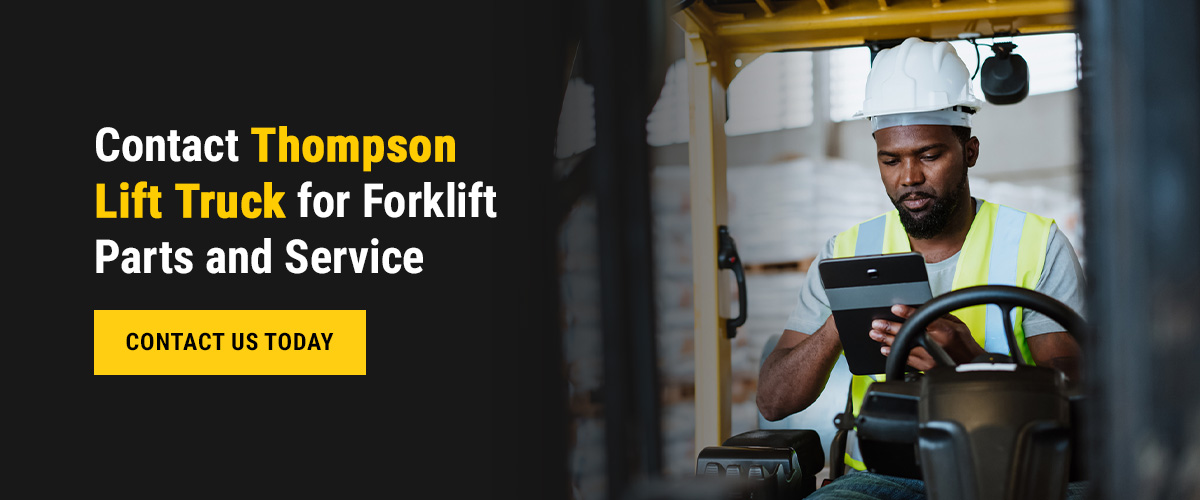
Why Is Forklift Preventative Maintenance Important?

Forklifts are essential to many industries, so regular maintenance and service on your forklift is critical to ensure they continue operating correctly. A well-maintained forklift will perform more efficiently and longer, helping you see a greater return on your investment. Neglected forklifts will require more frequent replacements and might break down more often, putting your workers at risk.
Forklift maintenance involves inspecting different components of the machinery. You’ll learn more about the benefits of forklift maintenance service, the recommended maintenance schedule, and the typical procedure in this article.
Forklift Preventive Maintenance Benefits
Regularly performing preventive maintenance on your forklifts has many benefits for your operations, including:
- Improved safety: Forklifts are a leading cause of workplace injuries and deaths, so you must take the necessary steps to prevent these accidents. Malfunctions can become dangerous to the operator and anyone around the forklift. Preventive maintenance helps ensure forklifts remain safe for operators and bystanders.
- Improved productivity: If a forklift breaks down, your productivity suffers. Preventive maintenance helps ensure forklifts continue operating as you need them. Even short inspections or maintenance appointments can ensure your forklift is able to handle the necessary workload. Regular preventive maintenance is especially important if you use your forklift daily.
- Increased life span: Preventive maintenance helps catch problems before they occur or become significant. Catching these problems prevents you from paying for expensive repairs down the line. Consistent preventive maintenance ensures you can get the most from your forklift throughout its life span. The more you perform maintenance on your forklift, the longer it’s likely to last.
- Increased resale value: You may not need a forklift for its entire service life or may decide to upgrade down the line. Regular maintenance on your forklift ensures it maintains its quality, meaning its resale value will likely be greater than a poorly maintained forklift. You can see a higher return when you take care of your forklift.
- Increase savings: If you perform preventive maintenance tasks, you’ll likely still encounter minor problems requiring repairs. However, if you don’t perform regular maintenance, you’ll likely face more significant issues that will be more expensive to repair. Preventive maintenance is an excellent way to reduce overall costs and limit how soon you need to replace your forklift.
Preventive maintenance is essential for your company. You’ll boost your productivity, improve worker safety, and gain a higher return by boosting your forklift life span, resale value, and repair savings.
Forklift Preventive Maintenance Schedule
The frequency of your forklift maintenance will depend on the quality of your equipment and the parts you need to check. A good rule of thumb is to perform preventive maintenance every 250 hours of operation. Another interval for forklift maintenance is every six weeks.
However, some features will need daily inspections, such as safety features and alarms. Other internal components will only need quarterly or yearly maintenance. Different factors influence how often your forklift will need to be maintained:
- Age: Older equipment often needs more maintenance than new equipment.
- Service history: If your service history indicates that a particular part of your forklift breaks down regularly, you should pay more attention to the component.
- Applications: Your applications may be more intensive and cause more damage to your forklift, requiring more frequent maintenance.
- Maintenance standards: The Occupational Safety and Health Administration (OSHA) has established a forklift maintenance policy, but you may go beyond this minimum to improve safety and efficiency.
Forklift Maintenance Procedure
While your forklift maintenance may vary if you have a specific problem with your machinery, there are a few aspects that should be covered regularly:
Tires
Forklift tires can wear out quickly, especially with excessive use. Repetitive motions can cause the tread to wear out, sometimes more on one side than the other. Tires can also suddenly spring leaks or deflate. Tires are critical to your forklift operations, so they should be checked regularly to ensure they don’t suddenly blow out during work.
Tires should be checked as part of a daily inspection schedule. Tire checks should include pressure checks and a visual inspection to ensure the tread and tires are in good condition. You’ll want to remove any forklifts with damaged or leaking tires and replace them immediately to improve your productivity.
Tines
Forklift tines — also known as forks — carry loads, making them a vital part of your machinery. You’ll want to visually inspect your forklift tines daily for signs of damage, deformities, or wear. If you find any problems with your forklift tines, they should be removed immediately and repaired or replaced. Once the forklift tines are in good condition, you can return them to your work environment.
Fluid Levels
Forklifts use various fluids, including brake, hydraulic, and engine oil fluids. Based on the manufacturer’s manual, all fluids have recommended levels and safe ranges. They should never fall below these points before starting operations. You should check your fluid levels daily to ensure you’re meeting OSHA standards before you begin work each day.
Brakes
Your forklift’s brakes are essential for the safety of your operators and other workers in the area. Malfunctioning brakes can fail to come to a stop when needed, which could result in accidents that harm people or property. You should inspect your brakes daily to ensure they’re operating correctly. If you find problems with your brakes, you should have them repaired as soon as possible rather than waiting until they fail.
Safety Features
Forklifts have various safety features, such as alarms, spotlights, and mirrors. You’ll want to regularly check your forklift’s safety features to ensure they operate correctly. If your operators rely on safety features to perform their operations without risk of harm, a failing safety feature can be disastrous. All safety features should be inspected at the start of each day to determine if they’re working.
Contact Thompson Lift Truck for Forklift Parts and Service
If you need to perform maintenance on your forklift, Thompson Lift Truck has everything you need. We always keep a variety of forklift parts in stock to ensure you find what you need when needed. We also have a maintenance and service department that can help you keep up with your maintenance and get your forklifts up and running again.
Our parts and services are high-quality, and we offer support throughout the equipment’s entire lifecycle. You can rely on Thompson Lift Truck to keep your forklifts operating at peak efficiency. Contact us today to learn how we can help you with forklift maintenance!


